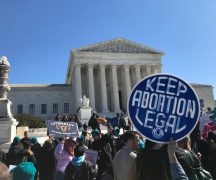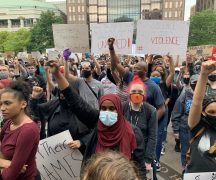Ohio Capital Journal
In nearly 15 years writing news, one of the most gut-wrenching, powerful stories I’ve ever covered happened three years ago this January when I interviewed Athens resident Alex Andrews less than a week after he had been shot through his kitchen window around 2 in the morning.
He remembered it all, in vivid detail. He remembered getting up early that Thursday morning for a snack. He remembered cutting up vegetables and hearing a sound at the window, and turning to see the figure of a man standing outside with a shotgun. He remembered thinking, “I’m about to get shot.” And then he was.
“The shot comes flying through and finds its way into nearly every part of my body from the knee up,” he said. “I started bleeding so intensely that within just a few blinks I realize my whole body is starting to ooze red.”
The police came and an ambulance arrived and Alex was helicoptered to West Virginia where he underwent several emergency surgeries and survived (it wasn’t until just this past fall that a grand jury indicted a New York man in the shooting).
Andrews is a tattoo artist who owns his own shop in Athens. It was his dream to open that shop — Thunder Bunny Tattoo Parlor. He worked hard as hell to open it, and he worked hard as hell to build it up. American dream stuff, right?
But while he built his business and worked hard as hell to do so, he couldn’t afford health insurance (many small business owners just starting out can’t afford health insurance). Medical professionals saved Andrews’ life, but he was left with over $500,000 worth of medical bills.
So somebody can pour everything within them to start their own business and build it as best they can, and practice their art, and hone their skills, and work as hard as they can, and one medical catastrophe can send them and their family hurling toward bankruptcy and financial ruin.
Except, in Andrews’ case, that didn’t happen, and it didn’t happen because two provisions in the Affordable Care Act were responsible for him not going broke and being forced to sell his business.
The provisions are presumptive eligibility and retroactive eligibility under Medicaid. With these provisions, Andrews was able to obtain health coverage without spending months waiting for Medicaid, and his coverage applied retroactively to the day he was shot. Without the Affordable Care Act, that wouldn’t have happened.
I think of these things every time I see the ACA under attack in our federal court system, most recently in the Texas v. United States case that may eventually wind up in front of the U.S. Supreme Court.
Eliminating the Affordable Care Act would also eliminate these critical protections for low-income people to avoid huge medical bills and financial devastation. Moreover, it would eliminate protections against discrimination for preexisting conditions.
An updated analysis in October from the health policy nonprofit Kaiser Family Foundation estimates that “almost 54 million people – or 27% of all adults under 65 —have preexisting health conditions that would likely have made them uninsurable in the individual markets that existed in most states before the Affordable Care Act.”
The elimination of the Affordable Care Act would be devastating to the health and finances of millions upon millions of Americans.
But more than that, new research is showing that many millions of Americans are continuing to go bankrupt due to medical trouble, even under the ACA.
CNBC reported in February 2019 on a study showing “that 66.5 percent of all bankruptcies were tied to medical issues — either because of high costs for care or time out of work. An estimated 530,000 families turn to bankruptcy each year because of medical issues and bills, the research found.”
Regarding the time out of work, that speaks to the need for adequate protections for workers dealing with medical situations. Regarding the high costs, a culprit has been inadequate health insurance, according to a co-author of the research, Dr. David U. Himmelstein, a professor at Hunter College and founder of advocacy group Physicians for a National Health Program, CNBC reported.
In an article on NASDAQ.com, Himmelstein expands: “For middle-class Americans, health insurance offers little protection. Most of us have policies with so many loopholes, copayments and deductibles that illness can put you in the poorhouse.”
The article goes on to say that, “in fact, bankruptcy due to medical bills is more likely to be the downfall of the middle class that it is the lower classes, with the study’s researchers noting that despite the Affordable Care Act, middle-class Americans have been targeted with increasing copayments and deductibles.” Himmelstein’s group pushes for Medicare for All.
Regardless of our feelings on Medicare for All, we know two things: (1) More than half a million American families are still filing bankruptcy each year tied to medical issues and bills, and (2) overturning the Affordable Care Act will rip what access there is to affordable care away from tens of millions.
If half a million American families are already filing bankruptcy each year because of medical issues, even under the ACA, eliminating the ACA will only make that terrible bankruptcy problem much worse.
Going backward on this issue makes no sense. No family facing a medical catastrophe should also be hurled into financial ruin. That should not have been the case before the ACA, it should not be the case now and we have an obligation to future generations to make sure that it won’t be the case for them.
This cruel dynamic of American medical/financial terror and devastation must end. Investment in personal medical leave for all workers would address part of the problem, and the need to not only protect but also expand access to truly affordable health care for all Americans is clear.





